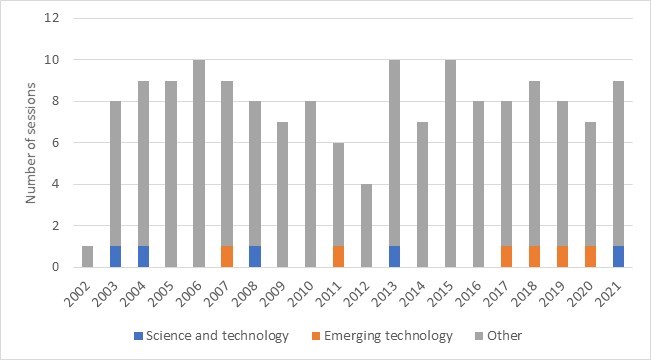Xi Jinping and the CCP’s expanding technology agenda

Chinese Communist Party leaders use ‘collective study sessions’ to identify emerging technologies that they can harness politically. Given the merging of civil and military industrial goals in China, the international community needs to recognise the challenges this strategy poses.
Huawei, one of tech war’s main supporting actors, recently completed the rollout in China of its new operating system, HarmonyOS 2.0, which aims to reduce China’s dependence on US technology. During his presidency, Donald Trump had turned that dependency into an existential threat.
While HarmonyOS is a success story in terms of Chinese innovation and scientific and technological progress, it also gives the party-state significantly more power in cyberspace.
Unlike its US rivals, iOS and Android, HarmonyOS requires third-party developers to go through an extensive identification process involving identity cards, passports and bank credentials. These developers, the growth drivers of such platforms, will be rendered, at least to some extent, subject to Chinese law regardless of where they live. That will enable Chinese authorities to bring previously unassailable individuals within the range of Chinese law by threatening them with sanctions, fines or bans. It will also give China increased leverage over newly developing cyber territories.
HarmonyOS’s strict developer identification process can be seen as part of the general regulatory wave targeting big tech in China. But it’s also a reflection of China’s successful transition towards a ‘government-steered market economy’. Over the past decade, the CCP has gained the ability to formulate, implement and evaluate government interventions. This ‘industrial policy’ is now managed through new institutions, interlocking policies and the strong integration of China’s tech companies. The policy has been tailored to reinforce the CCP’s legitimacy and power by developing emerging technologies and appropriating science and technology.
The CCP’s Politburo Standing Committee has long staged ‘collective study sessions’ (集体学习) to introduce the leadership to new ideas while establishing geopolitical contexts, new vocabulary and rhetorical frameworks. For two decades, these visions have been implemented throughout the party and across provinces through policies and laws, institutionalising party doctrine in emerging technology.
The cornerstone for HarmonyOS to expand the party’s sovereignty over cyberspace was set during the 38th collective study session on the development of internet technology in January 2007. Then president Hu Jintao called for the ‘construction and management of cyber culture’ to ‘spread [Chinese] advanced culture’ and ‘the advanced culture of socialism’. He discussed a ‘purified network environment’ (净化网络环境) and a new ‘order for the dissemination of online information’. That study session was followed by the banning of Google and Facebook within China, the expansion of China’s ‘Great Firewall’ and tighter online censorship.
Under Xi Jinping, government interventions have become more potent and Chinese cyber sovereignty has accelerated. China’s national security interests were extended to cyberspace in 2017.
The independent innovation capabilities of Chinese tech giants are suffering as military and civil industries are drawn much closer together and as accountability to the state for search engines, instant messaging services, websites, online payments, e-commerce and software increases.
Xi has also strengthened the signalling power of CCP study sessions to reach those developing new technologies. He has put more such technologies—big data, artificial intelligence and blockchain—on the study agenda than his predecessors and has made sure that the meetings are managed by his close allies, such as Ding Xuexiang, director of the General Office of the CCP, and Jiang Jinquan, director of the Central Policy Research Office.
Once portrayed as proof of the party’s learning capacity, study sessions are now a feature of a personality cult used by Xi to signal his technological vision to reinforce the party’s hold on power. His interest in ‘studying’ emerging technologies shouldn’t be taken simply as an acknowledgement of their economic gravity; it’s also a recognition of their central function in China’s strategic development.
The CCP holds between one (2002) and 10 (2006, 2015) ‘collective study sessions’ for its top ranks every year. In 2017, the head of the party ordered that a new emerging technology must be studied by the leadership every year. In contrast, Xi only put the overall development of science and technology on the agenda once between 2012 and 2016.
CCP collective study sessions by topic, 2002 to 2021

Source: CCP database of collective study sessions.
Xi declared in 2019 that blockchain would not only reduce cross-departmental and cross-sectoral data islands, but also help China exert ‘normative, discursive and rulemaking power’ through the application of the ‘rule of law’. His words caused a redirection of Chinese blockchain projects towards government services.
Similarly, in 2020 Xi identified quantum technology as an ‘emerging sector of strategic importance’ for ensuring ‘national security’ in which China needed to ‘seize commanding heights of international competition’. Two years before that, he declared AI important to China winning the global science and technology race by ‘becoming the pack leader’ (头雁).
China’s increased governmental steering of the economy has to be seen as inseparable from Xi’s vision for emerging technologies and will continue to have global implications. HarmonyOS’s strict registration requirements could soon include every user of the operating system, not just developers. Given Huawei’s strong and briefly world-leading share in the mobile phone market and China’s integral role in 5G mobile technology and the development of the internet of things, this could soon have an impact on a significant part of the global digital economy.
Accordingly, China’s efforts to standardise emerging technologies should be eyed with caution. That includes Beijing’s growing influence over the governance structures themselves (at Europe’s expense) and over efforts towards regional cooperation on standardisation, including the standardisation of technologies such as 5G and autonomous vehicles. Otherwise, tech standards will be developed rather disharmoniously to meet the primary political interests of the Chinese party-state.